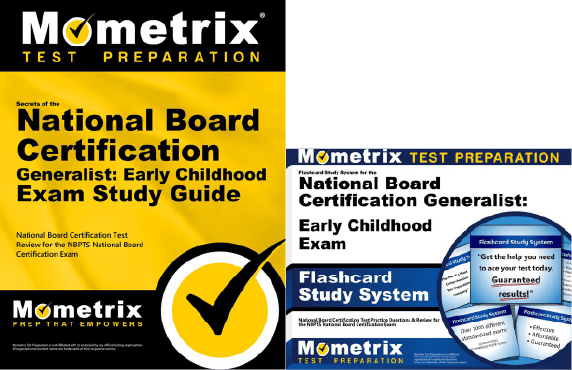If you need help studying for the National Board Certification’s Early Childhood Generalist exam or just want some more information about what the test is like, you’ve come to the right place.
Click below to take a free Early Childhood Generalist practice test!
What’s on the Exam?
The Architecture of Accomplished Teaching
How to Register
Exam Scores
Retaking the Exam
FAQs
Exam Eligibility
Before you can register to take the Early Childhood Generalist exam, you’ll have to meet the requirements below:
- You need a bachelor’s degree from an accredited institution
- You need a valid state teaching license
- You need to complete at least three years of teaching at one or more schools
If you meet these requirements, you’re set to begin the registration process!
What’s on the Exam?
The Early Childhood Generalist exam is split into four components. You have to finish all four to obtain certification, but Component 1 is the only exam component. The other three components are portfolio entries.
Component 3 (Teaching Practice and Learning Environment): For this portfolio entry, you’ll need to provide two short videos of your teaching practice and a written commentary/analysis.
Component 4 (Effective and Reflective Practitioner): For this portfolio entry, you’ll need to create a profile of your entire class, demonstrating how you gather and use information about your students from various sources to impact their learning, amongst other things.
On the exam component, there are 45 selected-response questions and three constructed-response questions, and your time limit is 2.5 hours.
Let’s take a closer look at the sections of the exam.
Selected-Response Section
45 questions
- Fostering cognitive development
- Fostering language development
- Fostering moral and ethical development
- Knowledge, skills, and dispositions related to equity, fairness, and diversity
Knowing and Integrating Subject Matter: Language and Literacy, Technology, Resources
- Language and literacy
- Listening and speaking
- Writing
- Technology
- Learning materials and resources
Knowing and Integrating Subject Matter: Science, Social Studies, Arts, Health, Physical Education
- Science
- Social studies
- Visual arts, music, and drama
- Health and physical education
Constructed-Response Section
3 exercises
You’ll be asked to plan a reading strategy based on a student’s strengths to improve their reading development.
2. Analyzing Student Work in Mathematics
You’ll be asked to identify and correct a student’s math misconception with an appropriate instructional strategy.
3. Children’s Play
You’ll be asked to demonstrate your understanding of child development through play by identifying and supporting key aspects of it.
The Architecture of Accomplished Teaching
The architecture of accomplished teaching provides a view of how the use of the five core propositions and the standards that are developed from them result in student learning.
- Teachers are committed to students and their learning
- Teachers know the subjects they teach and know how to teach those subjects to students
- Teachers are responsible for managing and monitoring student learning
- Teachers think systematically about their practice and learn from experience
- Teachers are members of learning communities
As shown here, one strand represents teaching practice as grounded in the five propositions, while the other strand represents the teacher’s impact on students and their learning.
How to Register
Once you’ve ensured that you meet all of the eligibility requirements, you can register for the exam.
To get started, you’ll need to create an account via the National Board Candidate Management System (NBCMS) system. You’ll be able to apply for, register and schedule your exam through this account.
Exam Scores
As we mentioned earlier, the first component is split into two sections. For the selected-response section, you’ll get one point for each correct answer. The cumulative raw score is then translated to a rubric scale ranging from 0 to 4.25. For the constructed-response section (as well as Components 2, 3, and 4) is evaluated using a 12-point rubric scale spanning from 0.75 to 4.25.
You can technically pass with a 1.75 average, but it’s not guaranteed. A 2.75 on each component is the only guaranteed way to get certified.
Retaking the Exam
If you didn’t get a passing score on your first try, that’s okay! You can retake any component up to two times within two years.
Keep in mind that you will have to pay the full testing fee every time you retake a component.
FAQs
How many questions are on the Early Childhood Generalist exam?
The exam (Component 1) contains 48 questions.
What is the time limit for the Early Childhood Generalist exam?
The exam (Component 1) is timed at 2.5 hours.
What is the passing score for the Early Childhood Generalist exam?
You’ll need to get a a final score of at least 2.75 to pass.
How much does the Early Childhood Generalist exam cost?
Each component costs $475.
Mometrix Test Preparation is not affiliated with or endorsed by any official testing organization. All organizational and test names are trademarks of their respective owners.



 EC Generalist
EC Generalist EC Generalist Flashcards
EC Generalist Flashcards
